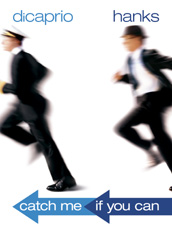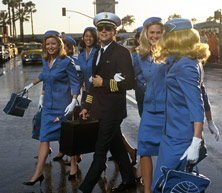|
Catch Me If You Can
|
| |
 |
USA, 2002. Rated PG-13. 140 minutes.
Cast:
Leonardo DiCaprio, Tom Hanks, Christopher Walken, Martin Sheen, Nathalie
Baye, Amy Adams, James Brolin, Brian Howe, Frank John Hughes, Jennifer
Garner, Steve Astin, Chris Ellis, John Finn, Ellen Pompeo
Writers: Jeff Nathanson, based on the autobiography by Frank W.
Abagnale with Stan Redding
Music: John Williams
Cinematographer: Janusz Kaminski
Producers: Steven Spielberg, Walter F. Parkes
Director: Steven Spielberg
LINKS
|
 irector
Steven Spielberg, a man in full command of his craft, continues to show a taste
for dissimilar projects, something we did not see in his earlier career. He
is not quite going from Jurassic Park to Schindler's
List, but the understated and decidedly retro Catch Me If You Can
is quite a contrast from its predecessor, the virtuoso and darkly futuristic
Minority Report.
irector
Steven Spielberg, a man in full command of his craft, continues to show a taste
for dissimilar projects, something we did not see in his earlier career. He
is not quite going from Jurassic Park to Schindler's
List, but the understated and decidedly retro Catch Me If You Can
is quite a contrast from its predecessor, the virtuoso and darkly futuristic
Minority Report.
Exceptional production values, expert cinematography, rock solid performances,
and an uncharacteristically mischievous, woodwind-heavy score by John Williams—Catch
Me If You Can has all the ingredients of a classic. But in this case, the
whole is not greater than the sum of the parts. Catch Me If You Can is
a fun movie and even an engrossing movie, but for all its merits, it is a bit
of ephemeral entertainment that most people won't be thinking about three days
later.
Not that there's anything wrong with ephemeral entertainment. Ocean's 11
was masterfully constructed light entertainment (yet still some condemned the
film because Steven Soderbergh had the gall to make something not Important).
Yet Catch Me If You Can, because of its biographical nature and length
(140 minutes), is less fun. It is a playful film, but also a serious film. The
combination in this case leads to a film that is funny…but not that funny,
thrilling…but not that thrilling, and moving…but not that moving.
Catch Me If You Can is a true story based on the autobiography of the
same name by Frank Abagnale, Jr. (Leonardo DiCaprio), who passed millions of
dollars in bad checks in the 1960s, while posing as a an airline pilot, a doctor,
and a lawyer. The most remarkable thing about Abagnale's exploits? He did it
all before the age of twenty-one, as a runaway teenager without even a high
school diploma. Today, Abagnale is…well, let's not spoil the ending.
The film opens with a flashback device, the television show To Tell the
Truth, in which three guests, two of them actors, pose as the same person
(Abagnale) and the contestants try to determine who is the real person. O ddly,
the film never returns to the show, but it doesn't matter. When Abagnale is
asked how he was finally snared, the film shifts to a prison in France, where
FBI Agent Carl Hanratty is in the process of extraditing him.
ddly,
the film never returns to the show, but it doesn't matter. When Abagnale is
asked how he was finally snared, the film shifts to a prison in France, where
FBI Agent Carl Hanratty is in the process of extraditing him.
Catch Me If You Can then faithfully chronicles Abagnale's career, along
with the odd relationship he develops with his dogged pursuer. Spielberg and
screenwriter Jeff Nathanson have chosen to use the relationship between Abagnale
and Hanratty as the lynchpin of the film, which would otherwise consist of an
episodic series of disconnected events. Where Abagnale's varied wardrobe features
items like bright orange sweaters and white pants, the bureaucratic and stolid
Hanratty (played ably by Tom Hanks) is always wearing the same dark suits and
dull ties. He knows that Abagnale is cleverer than he is, but he is not discouraged.
As Hanratty puts it, "The house always wins." Hanratty is no Inspector Javert,
however. He is not without sympathy for the kid. Gradually, he even becomes
something of a father figure as Abagnale realizes he can't keep the con going
forever and his real father and family recede into the background.
Abagnale's real father, Frank Abagnale, Sr., is played by Christopher Walken.
Walken is one of the best things about Catch Me If You Can. First, he
and Leonardo DiCaprio are a nearly perfect match to play father and son. They
have the same facial structure, broad with high cheekbones and high foreheads,
and the same general coloring--this should not be the only time they're cast
together as familial relations. Second, Walken seems to have remembered that
he's an Oscar-caliber actor, and not a guy who gets parts because he's Christopher
Walken, with the bizarre speech cadences and oddball behavior that entails (though
inevitably those are also present).
A flourishing business owner with looming IRS problems, Senior is a bit of
a confidence man himself, asking his son to pose as his driver when he goes
to the bank to attempt to smooth-talk his way into additional lines of credit.
He even makes his courtship of Mom, Paula (Nathalie Baye), sound like a successful
con game. Like a con game, his life proves to be an illusion. As his marriage
and career slowly disintegrate, Frank descends into the abyss, and Walken goes
with him, effecting a subtle but impressive transformation. There's a scene
late in the film when Walken spontaneously begins to weep, surprising even his
director.
Abagnale idolizes his father, and can't deal. His vow to "get it all back"
provides the impetus for one of the greatest con-man careers in American history.
Naturally, Abagnale Senior refuses to help the FBI track his son down. When
Hanratty visits Senior's home and snags Junior's address off an envelope while
Senior has his back turned, Walken fans will recall a similar scene in True
Romance, in which Walken's role is reversed and Dennis Hopper plays the
disobliging father.
The most memorable element of this not-that-memorable film, however, is not
Hanks or Walken, or any of the other irreproachable component parts. It is the
lead actor, roguish twenty-eight-year-old Leonardo DiCaprio. Anyone who has
seen This Boy's Life and What's Eating Gilbert Grape cannot question
his immense talent, but he sank under a wave of post-Titanic
backlash and went alarmingly adrift with The Beach. Now he's been out
of theaters for two years because of repeated delays with the release of Scorsese's
Gangs of New York. Here, DiCaprio is wholly convincing as both a sixteen-year-old
and a man in his late twenties, with only haircut changes and a modicum of makeup.
With a Scorsese and a Spielberg film in release in the same month and having
secured the title role in Baz Luhrmann's upcoming Alexander the Great,
DiCaprio's star is once again one of the brightest in the sky.
Review
© December 2002 by AboutFilm.Com and the author.
Images © 2002 Dreamworks LLC. All Rights Reserved.

 ddly,
the film never returns to the show, but it doesn't matter. When Abagnale is
asked how he was finally snared, the film shifts to a prison in France, where
FBI Agent Carl Hanratty is in the process of extraditing him.
ddly,
the film never returns to the show, but it doesn't matter. When Abagnale is
asked how he was finally snared, the film shifts to a prison in France, where
FBI Agent Carl Hanratty is in the process of extraditing him.
